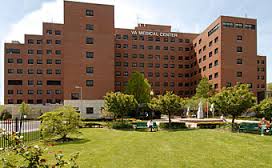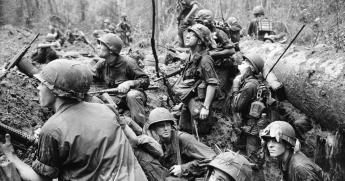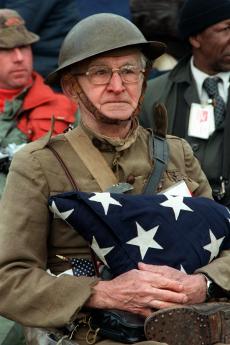Related Topics
Medical Economics
Some Philadelphia physicians are contributors to current national debates on the financing of medical care.
Insurance in Philadelphia
Early Philadelphia took a lead in insurance innovation. Some ideas, like life insurance, flourished. Others have faded.
Insurance-Like Financial Retirement
There are other ways to support retirement, but most retirement plans before the public are based on the insurance model.
Veterans Hospital

|
| Philadelphia VA Medical Center Home |
At a recent meeting of the Right Angle Club, Stephen C. Bennett an administrator, and Alix Esposito a social worker, kindly addressed the club about the Veterans Hospital where they work. The federal government pushes its mass produced products into every city, but gradually a local flavor starts to creep in; how this process works is illustrated by the fact that Steve's grandfather Claude was once the manager of the Bellevue Stratford Hotel. The VA hospital may be a piece of Washington D.C. planted on Philadelphia soil, but Philadelphia will surely absorb it with the passage of enough time. The VA was once a part of the Veterans Administration, but now it is a part of Department of Veterans Affairs, run by a Cabinet Secretary, no less. It's the second largest department of the federal government, and since the only bigger department is the Department of Defense, the combination of the two shows you how far we have come from the nation's original opposition to "standing armies". The fact that these two components of our war machine are separate, on the other hand, surely symbolizes some hidden tensions between our regular armed forces and the American Legion, or the hidden frictions between two congressional committees, or else some other mystery of bureaucratic politics.
The Veterans Administration was founded in 1930, the Philadelphia VA Hospital was built in 1950. Originally, it was designated as a Deans Hospital, signifying the intention to confer prestige and lessen friction with the medical schools. Originally, Philadelphia's VA was affiliated with several medical schools, but in time its proximity to the University of Pennsylvania led to the elimination of ties with other schools. Although the bed capacity is growing in reaction to America's successive wars, its open wards converted after 1960 to more semi-private style, and its focus of medical activity shifting with changes in medical science, the VA remains isolated from the rest of the city and the rest of Philadelphia medicine. Part of this is physical; the hospital is confined by the University of Pennsylvania, the parking complex next to the Amtrak line, and the Woodland Cemetery, so there is little room to grow. And comparatively little commonality with the neighbors. There are 2000 employees and a $30 million budget, marooned in a sea of automobile traffic going elsewhere in a big hurry, too big to ignore but too small to influence the local culture.

|
| Vietnam War |
The patients are distinctly different from those you find in other hospitals. There is a great deal of chronic mental disorder a heavy influence of alcohol and substance abuse and rehabilitation, and even some residential apartments for patients. On a national level, between a third and a half of homeless people are veterans, but for some reason in Philadelphia, only a tenth of the homeless are veterans. During the Vietnam War, the system of draft avoidance through educational exemptions resulted in that generation of veterans coming from an unusual concentration of low income and low educational subgroups. The system of government pensions and promotions tend to retain employees in the system for a lifetime. It's true that informal transfer arrangements allow a certain amount of migration to Florida (in the winter), or Maine (in the summer), or California (to see what LaLa land is all about), but those who do this stay within the VA system. Consequently, the interchange of ideas and techniques that professionals carry with them between hospitals is curtailed, confined somewhat to variations within the VA system, conforming to its social norms. An archipelago, although not exactly a gulag archipelago.

|
| Veteran |
But by far the greatest source of distinctiveness in the VA hospitals comes from the byzantine eligibility standards for the patients. The reimbursement systems of Medicare, private insurance -- which more or less copy each other -- changed around 1988 in a way that more or less eliminated psychiatric inpatient care in the community, especially if it lasts more than a month. The VA, on the other hand, was forced by circumstances to increase its attention to this area. Consequently, all social workers everywhere inquire immediately whether an addict or a schizophrenic might be a veteran. A differential sorting process quickly gets underway, with the VA as the preferred place to send such patients if at all possible. Non-veteran victims of the same conditions tend to have a worsened time of it, because the pressure on state and local governments to make some provision, has been relieved.

|
| Walter Reed Hospital |
At the other extreme, the social elite of the armed forces are not admitted, either. President Eisenhower was unquestionably a veteran, but he had his famous hospitalizations at >Walter Reed Hospital. There's an income limit for VA admission, which automatically cuts off 20-year veterans above a certain rank, possibly major. And there are overlapping disability classifications for military hospitals and veterans facilities, with considerable latitude available to uniformed boards of three serving officers, only one of whom is a physician. The result is a general perception that if you have any influence at all, you can generally avoid the VA and be treated in a military hospital, probably in a VIP unit. Good for them; I'd take advantage of it if I had a chance, too. But by siphoning off the top brass, a lot of pressure to improve quality is removed as well. If a VA hospital had eight or ten Admirals and Generals as patients, with academy classmates coming to visit, it's safe to assume that courtesy, orderliness, and cleanliness would instantly improve. And take it from me, the quality of care would improve, as well.
Originally published: Tuesday, March 17, 2009; most-recently modified: Sunday, July 21, 2019
| Posted by: esalerugs coupons | Feb 13, 2012 9:24 AM |